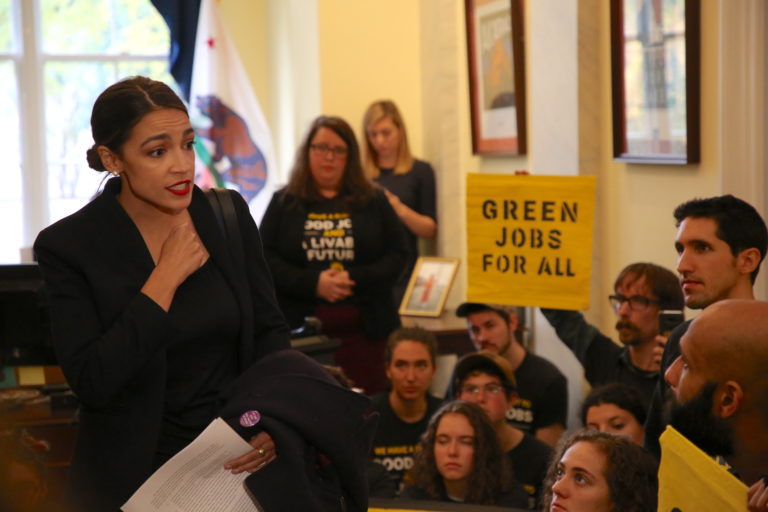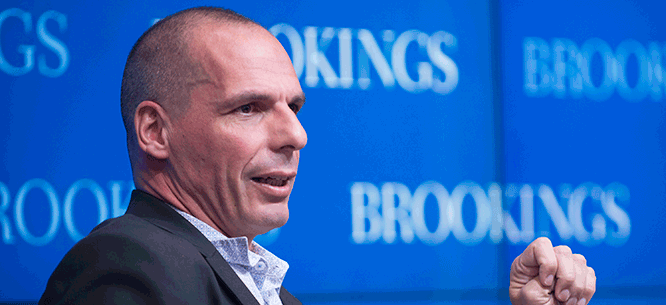Gearing Up for a Green New Deal - Alexandria Ocasio-Cortez and the plan to change everything
https://portside.org/2018-12-20/gearing-green-new-deal-alexandria-ocasio-cortez-and-plan-change-everything

The Indypendent

A thirty-foot sperm whale comes up for air. Before slipping back into the deep blue its eye gleans sight of something strange in the distance. To the whale, it looks like a flock of seagulls, each with three wings flapping. For some reason, they can’t take off.
She doesn’t pay them any mind. She’s busy with a calf to feed, her third in the past decade. When she was a calf herself, the three-winged seagulls weren’t there. But she is spotting more and more of them as she swims off the coast of Long Island these days.
She’s noticed other changes as well. The water is cleaner, and there are more and more of her kind coming upon one another. And why not? There’s plenty of squid and a lot fewer plastic bags to prey on these days.
Unbeknownst to her, the two aren’t unrelated, the fertile ocean and the strange birds on shore — what the whale’s distant evolutionary relatives in the human race refer to as wind turbines. If her eye could stray further, take on a loftier gaze, she would see that her distant cousins are busy at work, raising solar panels atop their buildings and homes, retrofitting them too, so that they will be cooler in the summer and warmer in the winter. She’d witness streets virtually devoid of vehicles save for schools of buses, gobbling up passengers like cephalopods and subway cars gliding without a hitch, graceful as eels over bridges.
This is a world where human and animal and environment are approaching harmony. It is nowhere near the “Hallelujah” chorus of Handel’s Messiah, but it has come a long way from the thrash-metal discord days of fracking, tar sands extraction, open-pit coal mining, uranium excavation, deepwater drilling, deforestation and the general masochistic flaming frenzy that characterized 20th and early 21st-century ecology. In other words, it is a far cry from the world we currently inhabit. It’s one that, if built, will be built by dreamers. It will require those in power now — who, for all their talk about the glory of capitalist innovation, can’t see beyond tomorrow’s Dow Jones index to save the planet — to listen to America’s youth, its scientists, its rebels and to the rumblings of Gaia herself and make way for some true innovation.
If this green future comes to pass, those of us fortunate enough to inhabit it may look back on Nov. 13, 2018 as a turning point. That’s the day 200 young climate change activists occupied the soon-to-be Speaker of the House’s office on Capitol Hill, many carrying orange placards that asked, “What is your plan?” Fifty-one youth in total were arrested, charged with obstruction.

Credit: Sunrise Movement.
In addition to a fine, the charge carries with it a certain irony. While they were there to disrupt business as usual in Nancy Pelosi’s lair, the underlying purpose of their visit was to make a deal, a Green New Deal, and spur the kind of investment in combating and adapting to climate change that Pelosi and other leaders of the country’s two main political parties have obstructed over the past two decades. Coming as it did in the wake of a UN Intergovernmental Panel on Climate Change (IPCC) report that warns humankind has just 12 years to drastically reduce its output of heat-trapping greenhouse gases or global warming will be irreversible, and given extra media attention thanks to the presence of camera-trailed Congresswoman-elect, Alexandria Ocasio-Cortez (D-NY), the sit-in helped push the Green New Deal into the national conversation.
‘What Science And Justice Demand’
So, what is a Green New Deal and why are our nation’s elites so reluctant to move on it?
 Early next year, the U.S. International Trade Commission (USITC) will publish a formal report on expected impacts from the proposed North American Free Trade Agreement (NAFTA) revision. This report will be used by Congress to make decisions about whether to support NAFTA 2.0 as written or to demand further changes.
Early next year, the U.S. International Trade Commission (USITC) will publish a formal report on expected impacts from the proposed North American Free Trade Agreement (NAFTA) revision. This report will be used by Congress to make decisions about whether to support NAFTA 2.0 as written or to demand further changes. 




